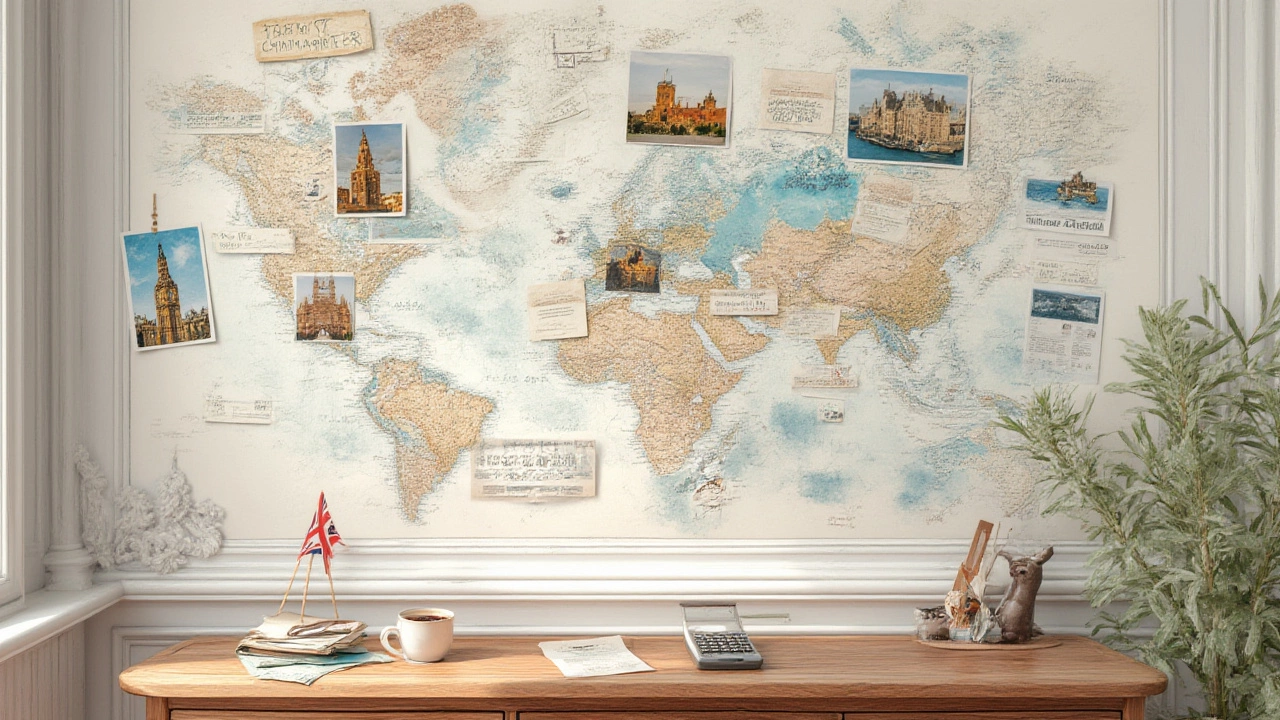Realistic Vacation Budget: How Much Should You Really Spend on Holiday?
 Jul, 10 2025
Jul, 10 2025
Picture this: you’re daydreaming of a relaxing escape, maybe sunbathing on a Greek island or rambling through Parisian streets. Suddenly, you’re hit with that classic question: How much should a vacation actually cost? Setting a realistic vacation budget turns out to be trickier than most of us expect. Between scrolling dreamy Instagram feeds and seeing friends' highlight reels, it's way too easy to underestimate the true cost of travel. I’ve been there—my husband Ethan even jokes that Whiskers, our cat, lives a fancier life at home than we do in hotels sometimes. But there's a fine line between being budget-savvy and just depriving yourself of a memorable trip.
Breaking Down the True Cost of a Vacation
Let’s really dig into what makes up a vacation budget. It’s rarely just flights and hotels. Think about meals, activities, tips, transport at your destination, insurance, and those sneaky little extras (like ice creams, or charging phone abroad when you forget your adapter). According to ABTA (Association of British Travel Agents), UK holidaymakers typically spend £500-£1000 per person for a week-long European getaway, though luxury breaks or long-haul trips can easily double or triple that. Flights can eat up the biggest chunk, but local transportation—like high-speed train tickets, ferries, or daily metro passes—can quietly nibble away at your total. And let’s not forget luggage fees (hands up if you’ve been caught at the gate for a heavy carry-on!), visas for certain countries, or vaccinations if you’re headed somewhere tropical.
Food is another wild card. Some people survive on supermarket sandwiches and street snacks, others want a white-tablecloth dinner every night. Throughout France, a basic set menu lunch can run €15-€20 but head to a hot spot in Barcelona and you might pay the same for a single round of tapas and sangria. If you’re after specific experiences—like wine tasting in Tuscany or diving in the Maldives—those costs can skyrocket. Travel insurance isn’t glamorous but it’s a must (the Association of British Insurers says the average travel insurance claim is over £800, not pocket change if you have to cancel last-minute).
How to Calculate a Realistic Vacation Budget
So, where do you start? Figure out your fixed costs first: flights, accommodations, any pre-booked tours or tickets, and travel insurance. Websites like Skyscanner and Kayak are great for comparing flight prices; for accommodation, try Booking.com for hotels or Airbnb for flats. Once that’s done, be honest with yourself about daily spending. A good rule is “50-30-20”: allocate about 50% of your daily budget for eats and treats, 30% for activities, and save 20% for surprise costs or emergencies (like a forgotten phone charger or impulse-buying local crafts).
I always keep a little cushion—at least 10% of the total trip fund—in a separate account, just in case something unexpected pops up. If I wind up not spending it, that’s souvenir money for Whiskers’ new collar. Look up average local prices before booking: Numbeo and Expatistan are solid sources for city cost comparisons. Take London—where a day out with public transport, museum entries, and meals can easily top £100 per person. Compare that with a city like Budapest, where the same experiences might land around £50. If you or your travel buddies have different priorities (say, Ethan wants to splash out on a Michelin dinner, but you’d rather take a sunset boat ride), make a “must-have” and “nice-to-have” list. That way, you can balance splurges against savings.

Hidden Expenses Many People Forget
It’s the small things that can trip up a travel budget faster than a cat leaping onto the counter. Start with airport transfers—sometimes they cost almost as much as the flight if you’re landing late or staying far outside the city center. Then there’s parking if you leave your car at the airport. Luggage storage? Many hotels charge for early check-in or late checkout. Walk into a famous museum and find the audio guide is an extra €10 per person, and suddenly your “free museum entry” from your city pass feels less generous.
And let’s talk data roaming and phone plans. Nearly a third of Brits in a 2024 GoCompare travel survey admitted they were caught off guard by mobile phone costs after Brexit changed EU roaming rules. Travel SIMs or local eSIMs save cash, but hardly anyone remembers to factor them in ahead of time. Then you’ve got laundry (try finding a laundrette in an Oslo suburb on a Sunday!), bottled water in countries where the tap isn’t safe, and those last-minute sunhats or sunblock purchases. Even a surprise 2-euro bathroom charge at the wrong moment can add up if you’re zig-zagging across a big city. Plan for these sneaky expenses with a daily ‘miscellaneous’ buffer—about £10-£15 a day gives you breathing room.
Tips for Stretching Your Holiday Money
Want to actually enjoy your trip without forever checking your wallet? Timing is everything. Travel in shoulder seasons—late spring or early autumn—removes a chunk of the cost. March and October often mean lower prices, thinner crowds, and easier upgrades. Direct flights are easy, but a quick stopover can drop long-haul fares by 30-50%. Set price alerts and don’t be afraid to use incognito window to avoid cookie-based price hikes (yep, airlines do that—ask any deal hunter!).
Accommodation eats up the budget fast, so shop smart: compare private rentals, B&Bs, and small hotels. Loyalty programs sometimes offer free nights or upgrades even on your first booking. I’m a fan of packing breakfast snacks and going heavy on picnic lunches—local supermarkets in places like Portugal or Greece are a treasure trove of cheap, delicious options. Public transport day passes are your friend in most cities, and lots of big European ones offer “tourist cards” for discounted attractions and travel. Invest in a reusable water bottle—tap water in much of Europe is just fine. When it comes to cash versus card, check if your bank charges international fees or if you need a no-fee travel card. Those couple of pounds per transaction can quickly eat into your realistic vacation budget.
Group deals or splitting activities brings costs down, too—I once shared a private Venice gondola ride with two other couples we met in line, slashing the price and doubling the laughs. If you’re local to your departure city, keep your eyes peeled for flash deals or “error fares” offered by airlines and travel sites (I once nabbed a Paris return for £65 thanks to a Wednesday flash sale). And before you jet off, download must-have travel apps; Google Translate, XE Currency, and a basic map for offline use.

Building a Budget for Different Types of Travelers
Single? Traveling as a family? Planning a romantic escape with your partner? Each scenario demands a different approach. Solo travelers often pay more per head for accommodation but save on flexibility—hostels, shared flats, and last-minute bookings unlock big deals. Family trips require space and comfort; self-catering apartments may seem more expensive upfront, but let you cook (and control meal costs) and often come with amenities like washing machines and kitchens. Saving £30 per night on breakfasts adds up fast over a fortnight!
Couples can balance splurges and savings together—splitting costs on taxis or luxury meals, and picking a mix of budget and blow-out experiences. If you’re headed with a group of friends, look for group accommodation like cabins or villas. Agree on a shared fund for groceries or outings to avoid awkward IOUs later. Young travelers can check out discount cards like the European Youth Card or ISIC for student discounts, and over-60s might find senior rates for trains or attractions (my mum swears by them in Italy and France!).
For that luxurious treat—think overwater bungalows in Bora Bora—costs easily rise into four figures per night, but mid-range travel doesn’t mean missing out. Opt for boutique guesthouses, off-peak flights, and independent local restaurants instead of tourist hotspots. If you’ve got pets at home, factor in their care too (we line up Whiskers’ cat-sitter when booking flights!).
Templates and worksheets help—apps like Trail Wallet let you track spendings in real time. If you want an “all in” number from the start, add up the core costs, daily spends, a buffer, and 20% for luck. That’s your magic number. Adjust travel dreams up or down to match what’s in your wallet, not the other way around.
